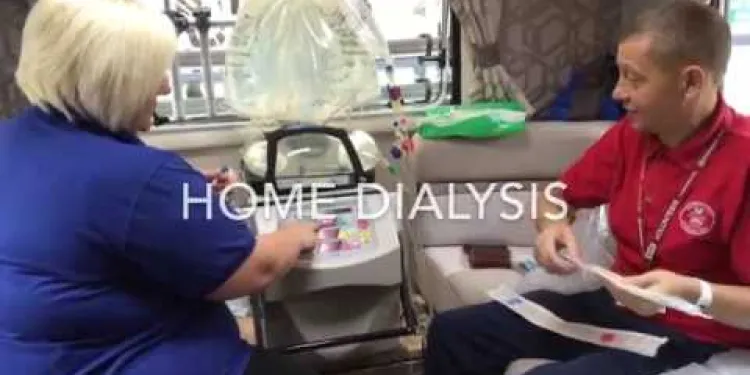Find Help
More Items From Ergsy search
-

Home dialysis help for kidney patients
Relevance: 100%
-

Peritoneal Dialysis - Information Video
Relevance: 58%
-

Chronic kidney disease: What are the treatments?
Relevance: 57%
-

Patient Stories - Having a kidney transplant
Relevance: 51%
-

Home Haemodialysis - Donna's story
Relevance: 46%
-

Matthew's Story: Kidney Transplant - Part 1
Relevance: 46%
-

Is dialysis used in methanol poisoning cases?
Relevance: 46%
-

Having a kidney transplant
Relevance: 39%
-

Kidney transplant waiting stories – DJ Ace and Lauren | NHS Organ Donation
Relevance: 37%
-

What is my risk of kidney failure with CKD (chronic kidney disease) | UHL NHS Trust
Relevance: 37%
-

Does Ozempic have an impact on kidney function?
Relevance: 35%
-

What are kidney stones?
Relevance: 33%
-

What causes chronic kidney disease?
Relevance: 33%
-

What should I eat to help with chronic kidney disease?
Relevance: 32%
-

Living with early stage kidney disease
Relevance: 32%
-

NHSGGC - Diet and Chronic Kidney Disease (CKD)
Relevance: 31%
-

Can Baxdrostat be used in patients with renal impairment?
Relevance: 30%
-

Can technology aid in the care of Alzheimer's patients?
Relevance: 23%
-

How do virtual wards improve patient outcomes?
Relevance: 22%
-

Are virtual wards suitable for elderly patients?
Relevance: 22%
-

How do virtual wards differ from traditional home healthcare?
Relevance: 22%
-

What is self-testing for eye patients?
Relevance: 22%
-

What types of self-tests are available for eye patients?
Relevance: 21%
-

How are care homes different from nursing homes?
Relevance: 21%
-

Positioning for Breathless Patient
Relevance: 21%
-

Same day discharge for NHS Golden Jubilee’s hip replacement patients
Relevance: 21%
-

What are Care Homes?
Relevance: 20%
-

Can carers of Alzheimer's patients access in-home healthcare services?
Relevance: 20%
-

What government assistance is available for carers of Alzheimer's patients?
Relevance: 20%
-

What kind of support will I receive at home on a virtual ward?
Relevance: 20%
-

What support is available for carers of Alzheimer's patients?
Relevance: 20%
-

Fire Safety At Home
Relevance: 19%
-

Are there different types of care homes?
Relevance: 19%
-

The role of residential and nursing homes
Relevance: 19%
-

What legal rights do I have as a medical patient in the EU?
Relevance: 19%
-

Neuroendocrine tumour patient video
Relevance: 19%
-

The role of residential & nursing homes
Relevance: 19%
-

What is the Warm Home Discount?
Relevance: 19%
-

Is a colonoscopy necessary after a positive home test?
Relevance: 19%
-

Is the Warm Home Discount a loan?
Relevance: 19%
Home Dialysis Help for Kidney Patients
Understanding Home Dialysis
For kidney patients in the United Kingdom, home dialysis offers a flexible and convenient alternative to in-centre treatment. There are primarily two types available: Peritoneal Dialysis (PD) and Home Haemodialysis (HHD). Both methods allow patients to perform treatments in the comfort of their homes, providing more control over their schedules and lifestyles.
Receiving Home Dialysis Training
The UK’s National Health Service (NHS) provides comprehensive training for home dialysis. Training usually lasts several weeks, during which patients and their carers learn how to safely and effectively perform the treatments. The training includes handling dialysis equipment, recognising potential complications, and understanding the importance of hygiene to prevent infections.
Equipment and Supplies
Home dialysis requires specific equipment and supplies, which the NHS delivers directly to patients' homes. This includes dialysis machines, dialysis fluid, and other necessary accessories. Regular deliveries ensure that patients always have the supplies they need without the stress of sourcing them independently.
Support and Monitoring
Support doesn’t end with training; ongoing support from healthcare professionals is a crucial component of home dialysis. Patients have access to a dedicated team of nurses, renal dietitians, and nephrologists who provide regular check-ups, answer queries, and offer guidance as needed. Advanced telemedicine options may also be available for remote consultations and monitoring.
Benefits of Home Dialysis
Home dialysis provides numerous benefits, including greater flexibility, more consistent treatment timings, and improved quality of life. For many, it reduces the need for frequent trips to the hospital, allowing more time for family, work, and personal activities. Additionally, home dialysis often leads to better health outcomes and fewer dietary restrictions compared to in-centre dialysis.
Considerations and Eligibility
Not every patient is suitable for home dialysis. Factors like the patient's home environment, personal preference, and overall health condition play a significant role in determining eligibility. Collaborating with healthcare providers is essential to ensure a safe and effective home dialysis setup.
Home Dialysis Help for Kidney Patients
Understanding Home Dialysis
For people with kidney problems, home dialysis is a way to get treatment at home. It is easier than going to the hospital. There are two types: Peritoneal Dialysis (PD) and Home Haemodialysis (HHD). Both let people do the treatment at home, which means they can decide when and how to do it...
Receiving Home Dialysis Training
In the UK, the NHS helps by teaching people how to do home dialysis safely. This teaching takes a few weeks. People learn to use the machines, watch out for problems, and keep everything clean to stop germs.
Equipment and Supplies
Home dialysis needs special machines and supplies. The NHS sends these to people's homes. They send machines, fluid, and other things needed. Regular deliveries make sure there is always enough.
Support and Monitoring
After training, help keeps coming. Nurses and doctors are there to check on patients, answer questions, and help when needed. Sometimes, people can talk to doctors on video calls without leaving home.
Benefits of Home Dialysis
Home dialysis has many good points. It gives more freedom, lets people plan treatments better, and improves life quality. People don’t need to go to the hospital so often. This gives more time for family, work, and fun. It can also make them healthier.
Considerations and Eligibility
Not everyone can do home dialysis. Things like the home setting, what a person likes, and their overall health matter. Working with doctors is important to decide if home dialysis is right and safe.
Frequently Asked Questions
What is home dialysis?
Home dialysis is a treatment for kidney failure that allows patients to dialyze in the comfort of their own homes. This can include both peritoneal dialysis (PD) and home hemodialysis (HHD).
Who is eligible for home dialysis?
Eligibility for home dialysis is determined by a healthcare provider based on medical history, lifestyle, and the patient's ability to perform dialysis tasks independently or with the help of a care partner.
What are the main types of home dialysis?
The main types of home dialysis are Peritoneal Dialysis (PD) and Home Hemodialysis (HHD). PD uses the lining of the abdomen to filter waste, while HHD uses a machine to filter blood.
How often do I need to perform home dialysis?
The frequency varies depending on the type of dialysis. PD is typically performed daily, while HHD can be done three to seven times a week, depending on individual treatment plans.
What equipment do I need for home dialysis?
Home dialysis requires specific equipment such as a dialysis machine, dialysate fluids, tubing, and other medical supplies. Your healthcare team will help you set up your home dialysis equipment.
Will I receive training for home dialysis?
Yes, patients and their care partners receive comprehensive training from healthcare professionals to manage the dialysis process safely and effectively at home.
Does home dialysis offer any advantages over in-centre dialysis?
Home dialysis offers greater flexibility, more control over schedules, and the comfort of being in a familiar environment. It can also lead to better clinical outcomes and quality of life.
Are there any risks associated with home dialysis?
As with any medical treatment, there are risks, including infection, access site issues, and complications with the dialysis equipment. Proper training and adherence to protocols can minimize these risks.
How do I manage my supplies for home dialysis?
Your dialysis provider will arrange for the delivery of supplies to your home. Proper storage and handling instructions will be provided to ensure supplies are used correctly.
Can I travel while on home dialysis?
Travel is possible with proper planning. Discuss your travel plans with your healthcare team to arrange for supplies and support at your destination.
What should I do in case of an emergency during home dialysis?
Your training will include emergency protocols and contact information for medical support. Always have a phone nearby and know the steps to take in case of an emergency.
Is home dialysis covered by the NHS?
Yes, home dialysis is generally covered by the NHS, including equipment, supplies, and necessary training. Discuss specifics with your healthcare provider.
Can children perform home dialysis?
Children can perform home dialysis under the supervision of trained family members or caregivers. Special considerations and training are provided for pediatric patients.
Will I still need to see my nephrologist regularly?
Yes, regular appointments with your nephrologist are essential to monitor your health, dialysis effectiveness, and make any necessary adjustments to your treatment plan.
Can I perform home dialysis if I live alone?
It is possible to perform home dialysis if you live alone, but it depends on the type of dialysis and your ability to handle the procedures independently. Your healthcare provider will assess your situation and make recommendations.
What is home dialysis?
Home dialysis is a way to clean your blood at home. It helps when your kidneys are not working well. You can do it by yourself or with help from family or friends.
Supportive tools and techniques:
- Ask a nurse or doctor for help to learn how to do it safely.
- Use pictures or videos to see how it works.
- Make a schedule or checklist to remember each step.
Home dialysis helps people whose kidneys don't work well. It lets them get treatment at home. There are two ways to do this: peritoneal dialysis (PD) and home hemodialysis (HHD).
Who can do dialysis at home?
Doctors decide if you can do dialysis at home. They look at your health, how you live, and if you or someone helping you can do the dialysis tasks.
What are the main kinds of home dialysis?
Dialysis is a way to clean your blood when your kidneys don't work well. You can do this at home. There are two main kinds:
1. Peritoneal Dialysis (PD):
- You use a special fluid that goes into your belly to clean your blood.
- The fluid comes in and out through a soft tube in your belly.
2. Home Hemodialysis (HHD):
- Your blood is cleaned by a machine.
- It moves your blood through a filter and puts it back in your body.
For help, you can ask a nurse, watch videos, or use picture guides to learn how to do dialysis at home.
There are two main ways to do dialysis at home. One way is called Peritoneal Dialysis (PD). The other way is called Home Hemodialysis (HHD).
With Peritoneal Dialysis (PD), the inside of your tummy helps clean your blood. It gets rid of waste.
With Home Hemodialysis (HHD), a special machine helps clean your blood. It filters out the waste.
How many times do I need to do home dialysis?
You need to do home dialysis a few times each week. Ask your doctor how many times is best for you.
It can help to make a schedule, so you remember to do it. You can use a calendar or ask someone to remind you.
There are also phone apps that can help you keep track of your dialysis times.
How often you do dialysis depends on what kind you are using. With PD, you usually do it every day. With HHD, you can do it three to seven times a week. It depends on what your doctor tells you is best for you.
What things do I need for dialysis at home?
For home dialysis, you need special tools. These include a dialysis machine, cleaning fluids, tubes, and other medical stuff. Your doctor and nurse will help you get everything ready at home.
Will I get training to do dialysis at home?
Yes, patients and their helpers learn how to do dialysis safely at home. Nurses and doctors teach them everything they need to know.
Is doing dialysis at home better than going to a center?
Dialysis is a way to help clean your blood when your kidneys do not work well. You can do dialysis at home or at a center. Here are some things that might help you choose:
- Home Dialysis: You can do it at times that suit you. You may feel more comfortable being at home.
- Center Dialysis: You have nurses to help you. You go to a special place that has the machines.
It is important to talk to your doctor about what is best for you. You might also find picture guides or videos helpful to understand better.
Doing dialysis at home can be easier because you have more choices about when to do it. You can feel more comfortable because you are at home. It can also make you feel healthier and happier.
Is home dialysis safe?
Home dialysis can help clean your blood. But there are things to watch out for:
- Keep clean: Always wash your hands and use clean tools. This helps stop germs.
- Check often: Make sure the machine is working well. If something seems wrong, tell your doctor.
- Keep learning: Take classes to learn how to use the machine safely.
Tools to help:
- Ask for a caregiver or family member to help you.
- Use reminder apps to keep track of your schedule.
- Ask questions if you are unsure about anything.
When you have any medical treatment, there can be problems. Some problems are infections, issues where the needle goes in, and problems with the dialysis machine. Learning how to do things the right way and following the rules can help keep you safe.
How can I take care of my dialysis supplies at home?
Doing dialysis at home means you need supplies. Here are some tips to help you manage them:
- Make a List: Write down everything you need. This way, you will not forget anything.
- Stay Organized: Keep your supplies tidy. Put them in the same place every time.
- Check Regularly: Look at your supplies to see what you are running low on.
- Get Help: Ask a family member or friend to sort out supplies with you.
- Reminders: Use alarms or notes to remind you when to order new supplies.
If you need extra support, talk to your healthcare team. They can give more advice.
Your dialysis company will send you the things you need to your home. They will tell you how to keep and use the supplies safely and correctly.
Can I go on a trip if I do dialysis at home?
You can travel if you plan ahead. Talk to your healthcare team about your trip. They can help you get the things you need before you go.
What to Do in an Emergency During Home Dialysis?
If there is an emergency while you are doing dialysis at home, here is what you can do: - **Stay Calm:** Take deep breaths. - **Call for Help:** Dial 911 or the emergency number. - **Alarm Sounds:** Listen to your machine. Follow the instructions on the screen. - **Keep Phone Nearby:** Always have a phone close to you. - **Buddy System:** Have a family member or friend with you if possible. - **Emergency Kit:** Keep a kit ready with important things you might need. Remember, it is important to stay calm and call for help if you need it.You will learn what to do in an emergency. You will also learn who to call for help if someone is hurt or sick. Keep a phone close to you. Know the steps to follow if something bad happens.
Does the NHS pay for home dialysis?
If you need dialysis at home, the NHS can help. The NHS pays for home dialysis.
If you want to know more about home dialysis, you can ask your nurse or doctor. They will explain how it works.
Bring someone with you when you talk about it. A friend or family member can help you remember what the doctor says.
Yes, the NHS pays for home dialysis. This includes the machines, supplies, and training you need. Talk to your doctor to learn more.
Can kids do dialysis at home?
Dialysis is a way to help clean the blood when the kidneys do not work well. Some kids need dialysis to feel better.
Doctors can show parents and kids how to do dialysis at home. They use a special machine.
Parents help kids with home dialysis. Nurses and doctors will teach how to use the machine safely.
If kids learn and practice, they can do dialysis at home with help from adults.
Talking tools like pictures or videos can help explain how to do it.
Getting help from doctors and nurses is important to make everything safe.
Kids can do dialysis at home if a trained family member or helper is there. Kids and their families get special lessons to learn how to do this safely.
Do I still need to see my kidney doctor often?
Yes, it is important to see your kidney doctor often. They help check how healthy you are, how well your dialysis is working, and to change your treatment if needed.
Here are some helpful tips:
- Use a calendar or phone reminders to remember your doctor visits.
- Write down any questions you have to ask your doctor.
- Bring a friend or family member to help you understand what the doctor says.
Can I do dialysis at home if I live by myself?
You can do dialysis at home even if you live alone. Here are some tips:
- Training: You will get special training to learn how to do it safely.
- Support: You can have a nurse or helper check in with you.
- Tools: Use alarms or reminders to keep track of your treatment times.
If you have questions, ask your doctor or nurse to help you understand better.
You can do dialysis at home even if you live by yourself. It depends on the kind of dialysis and if you can do it without help. Your doctor will look at your situation and tell you what is best.
Useful Links
Have you found an error, or do you have a link or some information you would like to share? Please let us know using the form below.
-->
This website offers general information and is not a substitute for professional advice.
Always seek guidance from qualified professionals.
If you have any medical concerns or need urgent help, contact a healthcare professional or emergency services immediately.
Some of this content was generated with AI assistance. We’ve done our best to keep it accurate, helpful, and human-friendly.
- Ergsy carfully checks the information in the videos we provide here.
- Videos shown by Youtube after a video has completed, have NOT been reviewed by ERGSY.
- To view, click the arrow in centre of video.
- Most of the videos you find here will have subtitles and/or closed captions available.
- You may need to turn these on, and choose your preferred language.
- Go to the video you'd like to watch.
- If closed captions (CC) are available, settings will be visible on the bottom right of the video player.
- To turn on Captions, click settings .
- To turn off Captions, click settings again.
More Items From Ergsy search
-

Home dialysis help for kidney patients
Relevance: 100%
-

Peritoneal Dialysis - Information Video
Relevance: 58%
-

Chronic kidney disease: What are the treatments?
Relevance: 57%
-

Patient Stories - Having a kidney transplant
Relevance: 51%
-

Home Haemodialysis - Donna's story
Relevance: 46%
-

Matthew's Story: Kidney Transplant - Part 1
Relevance: 46%
-

Is dialysis used in methanol poisoning cases?
Relevance: 46%
-

Having a kidney transplant
Relevance: 39%
-

Kidney transplant waiting stories – DJ Ace and Lauren | NHS Organ Donation
Relevance: 37%
-

What is my risk of kidney failure with CKD (chronic kidney disease) | UHL NHS Trust
Relevance: 37%
-

Does Ozempic have an impact on kidney function?
Relevance: 35%
-

What are kidney stones?
Relevance: 33%
-

What causes chronic kidney disease?
Relevance: 33%
-

What should I eat to help with chronic kidney disease?
Relevance: 32%
-

Living with early stage kidney disease
Relevance: 32%
-

NHSGGC - Diet and Chronic Kidney Disease (CKD)
Relevance: 31%
-

Can Baxdrostat be used in patients with renal impairment?
Relevance: 30%
-

Can technology aid in the care of Alzheimer's patients?
Relevance: 23%
-

How do virtual wards improve patient outcomes?
Relevance: 22%
-

Are virtual wards suitable for elderly patients?
Relevance: 22%
-

How do virtual wards differ from traditional home healthcare?
Relevance: 22%
-

What is self-testing for eye patients?
Relevance: 22%
-

What types of self-tests are available for eye patients?
Relevance: 21%
-

How are care homes different from nursing homes?
Relevance: 21%
-

Positioning for Breathless Patient
Relevance: 21%
-

Same day discharge for NHS Golden Jubilee’s hip replacement patients
Relevance: 21%
-

What are Care Homes?
Relevance: 20%
-

Can carers of Alzheimer's patients access in-home healthcare services?
Relevance: 20%
-

What government assistance is available for carers of Alzheimer's patients?
Relevance: 20%
-

What kind of support will I receive at home on a virtual ward?
Relevance: 20%
-

What support is available for carers of Alzheimer's patients?
Relevance: 20%
-

Fire Safety At Home
Relevance: 19%
-

Are there different types of care homes?
Relevance: 19%
-

The role of residential and nursing homes
Relevance: 19%
-

What legal rights do I have as a medical patient in the EU?
Relevance: 19%
-

Neuroendocrine tumour patient video
Relevance: 19%
-

The role of residential & nursing homes
Relevance: 19%
-

What is the Warm Home Discount?
Relevance: 19%
-

Is a colonoscopy necessary after a positive home test?
Relevance: 19%
-

Is the Warm Home Discount a loan?
Relevance: 19%


